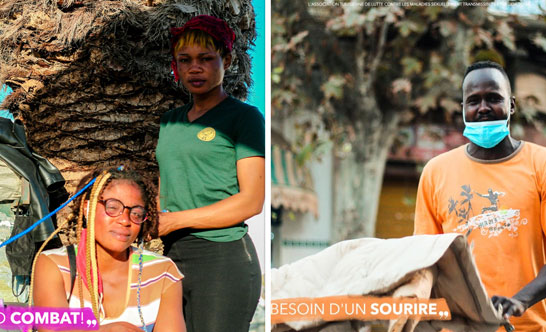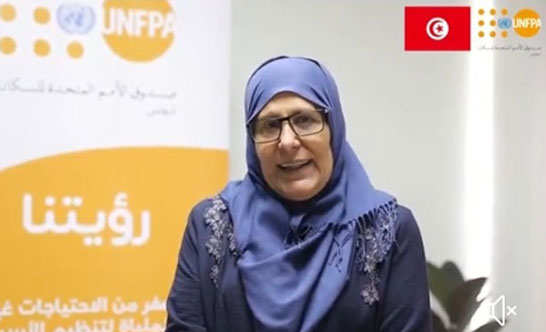MIGRATION
For better visibility and awareness about migration and migrants rights
Tunisia is characterized by a complex migratory dynamic. While it has long been qualified as a country of origin for migratory flows to Europe; this profile has changed a lot over the years, due to the drastic changes in the political, economic and security context of the region (in particular the conflict and instability in Libya, Syria, Mali…). In consequence, Tunisia is considered today as a country of origin, transit and destination for several types of migratory flows and different countries, in particular countries of Sub-Saharan Africa (SSA).
Certainly, the number of migrants in Tunisia is not significant in comparison to the neighboring countries. However, it is clear that Tunisia’s migrants profile is very heterogeneous and varies from one region to another. Data on the actual size of the migrant population in Tunisia is not comprehensive, and vary according to the sources. The number of international migrants is estimated at 57,900 people, 48% of whom are women (UNDESA, 2019). According to UNHCR, Tunisia currently has 6,744 refugees and asylum seekers, 37.4% of whom are from Ivory Coast, and 29.7% from Syria.
There is also a sub-Saharan community whose size varies between a few thousand and a few tens of thousands of people. Indeed, Tunisia has agreements with several countries on the African continent guaranteeing visa-free entry into Tunisia for 90 days.
There is also a sub-Saharan community whose size varies between a few thousand and a few tens of thousands of people. Indeed, Tunisia has agreements with several countries on the African continent guaranteeing visa-free entry into Tunisia for 90 days.
Migrants in Tunisia are facing multiple difficulties related to the lack of comprehensive legal frame on migration, which refers them to multiple vulnerabilities such as the difficulties of access to a regular status, trafficking in humans, access to information and access to services.
The COVID19 crisis has contributed to the exacerbation of the situation of migrants in Tunisia, on several levels: social, economic, health and individual. About 62% of migrants lost their source of income during the first wave and 49% during the second (MMC, 2020). Thus, these people find themselves unable to meet their basic needs.
At the same time, the loss of source of income has resulted in a precarious housing situation. Refugees and asylum seekers are exposed to the same vulnerabilities as other migrant groups and Tunisians, and they are likely to find themselves in a precarious situation due to their status, the high prevalence of refugees in the informal labor market and limited access to social and health services.
In this context, UNFPA has been working closely with local actors and services’ providers to improve migrants, refugees and asylum seekers access to services by supporting 14 services delivery points to integrate services’ provision to migrants; and to draw attention to the situation of their rights; as part of its engagements for the rights of everyone and especially those left behind.
During the first quarter of 2021, we focused on raising awareness activities to shed the light on Migrants situation, rights and success stories.
MIGRATION
“Here!”: migrants in Tunisia visibility month

“Here!” migrants in Tunisia visibility month
With a close collaboration with UNFPA Tunisia, ATL MST SIDA Tunis section conducted a month-long digital campaign dedicated to the visibility of migrant persons in Tunisia. The campaign kicked off on the streets of Greater Tunis by approaching migrant women and men, doing their daily chores, being an integrated part of the daily life of Tunis City, discussing their journey, perceptions and aspirations before snapping their photos.
The photos were published online from December 15 to January 25 on Facebook and Instagram; gaining an important and positive support; as it drifts away from the usual style of campaigns targeting migrants.
The campaign was later featured in Nawaat Magazine, a reputable engaged and independent collective news platform.
MIGRATION
Effective partnership to improve access to SRH care in Tataouine
On February 15 2021, UNFPA and ATSR organized in Tataouine, a southern border region in Tunisia, a workshop to present the results of the mapping conducted back in 2020 on the profile of migration in Tataouine, the needs in terms of SRH and GBV care and the landscape of stakeholders involved in the circuit of care.
The workshop was also an opportunity to hold a coordination meeting with local health departments, ATSR, IPPF and UNFPA, on the most urgent needs in terms of technical and material support and to study the feasibility of launching a working group on SRH aiming at tackling referral systems and capacity building of midwives and general practitioners on early detection of high risk pregnancy.
MIGRATION
Jointly for better programming on GBV in the context of international migration
Faced with the rise of GBV during the COVID19 pandemic, a regional webinar on " Response to Migration Issues in the Arab Region: Gender-Based Violence in the Context of International Migration” took place. UNFPA Tunisia along with IOM Tunisia seized this opportunity to share their lessons learned and best practices on tailoring GBV programming for migrants needs and specificities.
This meeting was also an opportunity to strengthen the dialogue between the two organizations for optimal coordination around the various processes dealing with the theme: the “International Conference on Population and Development” (ICPD), The Global Compact for Safe, Orderly and Regular Migration, as well as the 2030 Agenda for Sustainable Development.
MIGRATION
“Cheffe Amal”: From an asylum seeker in Tunisia to an entrepreneur

Cheffe Amal
As part of the celebration of International Women's Day, UNFPA Tunisia chose to celebrate the resilience and the leadership of migrant women by telling the story of “Chef Amal”, a Syrian refugee in Tunisia who succeeded to start off her personal catering project, that is now providing economic autonomy not just for her and her family, but also, to members of her community, migrants and Tunisians.
Through this video, Amal tells us how she made it through, despite the barriers faced by women refugees to access equal and decent working conditions.
This video is part of a week-long campaign, titled “one tale a day”, aiming at providing a digital space for migrant women to tell their stories and recount their experiences.
Link to the video: Hommage à Cheffe Amal, la réfugiée syrienne leader en Tunisie - YouTube
